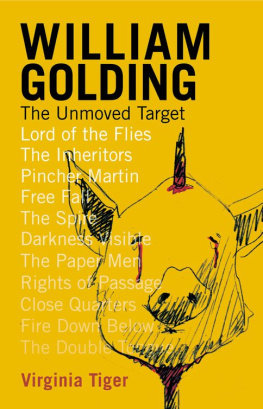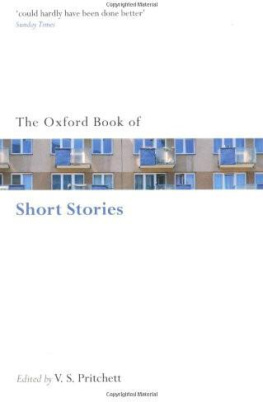The Living Novel

V. S. Pritchett

This electronic edition published in 2011 by Bloomsbury Reader
Bloomsbury Reader is a division of Bloomsbury Publishing Plc, 50 Bedford Square, London
WC1B 3DP
Originally published in 1946 by Chatto and Windus Ltd
The moral right of the author has been asserted
All rights reserved
You may not copy, distribute, transmit, reproduce or otherwise make available this publication (or any
part of it) in any form, or by any means (including without limitation electronic, digital, optical,
mechanical, photocopying, printing, recording or otherwise), without the prior written permission of the
publisher. Any person who does any unauthorised act in relation to this publication may be liable to
criminal prosecution and civil claims for damages
ISBN: 9781448200238
eISBN: 9781448201556
Visit www.bloomsburyreader.com to find out more about our authors and their books
You will find extracts, author interviews, author events and you can sign up for
newsletters to be the first to hear about our latest releases and special offers
Contents
The British
AN ITALIAN
The French
The Russians
To My Wife
When I was young and was reading too many novels the works of Fielding were regarded as one of the pleasant things in store for those about to reach the age of consent. He was the last novelist, as Thackeray said, to be allowed to describe a man, and there were book-soaked critics like Professor Saintsbury to expatiate over their wine upon Fieldings use of the privilege. It is true that Dr. Johnson called Fielding a blockhead and that Richardsonwho had reason to spit and squirmdismissed him as an ostler; but on the whole the warm impression of his genius and character prevailed, the impression which was most frankly but tolerantly conveyed in one of the letters of Lady Mary Wortley Montagu:
I am sorry for H. Fieldings death, not only as I shall read no more of his writings, but I believe he lost more than others, as no man enjoyed life more than he did, though few had less reason to do so, the highest of his preferment being raking in the lowest sinks of vice and misery. I should think it a nobler and less nauseous employment to be one of the staff-officers than conduct the nocturnal weddings. His happy constitution (even when he had, with great pains, half demolished it) made him forget everything when he was before a venison pasty, or over a flask of champagne, and I am persuaded he has known more happy moments than any prince upon the earth. His natural spirits gave him rapture with his cook-maid, and cheerfulness when he was fluxing in a garret. There was a great similitude between his character and that of Sir Richard Steele. He had the advantage both in learning and, in my opinion, genius; they both agreed in wanting money in spite of all their friends, and would have wanted it, if their hereditary lands had been as extensive as their imaginations; yet each of them was so formed for happiness, it is a pity he was not immortal.
Alas, the vogue of Fielding had passed by the time I grew up. The secret: reading of the mid-Victorians, and late, had lost its spell. The muscular Christians who were privately addicted to his muscular impropriety had given place to a generation with a feminine preoccupation with sex and the fortune-telling science of psychology. If one was going to read the eighteenth-century novelists at all, Richardson was your man and the masculine tradition of Fielding was less congenial. It is typical of our taste that Proust was greatly influenced by Richardson; and that when we look back to the earliest realism, we prefer the ungarnished plate of Defoe to the stylish menu that is handed to us by the author of Tom Jones and Joseph Andrews. He is said to be altogether too hearty, towny and insensitive. He is said to be that most tiresome of bores, the mans man. He sets up as the shallowest of philosophers: the man of the world, whose world turns out to be a box of tricks. And what does the philosophy amount to beyond a number of small notions: that society is not what it seems, that self-love and self-interest are the beginning and end of human motive, and that the only real and virile view of human nature is the low one? His geniality laboured the offence.
One has to admit the force of such a criticism of Fielding, but I am far from thinking it fatal to his rank as a novelist. In the first place the criticism is really aroused by his style rather than by his matter. Fielding is out to cut a figure. When he sets up as a satirist, he believes in the robust satire of the man who lives, not in the more cruel satire of the weaklivered man who abstains and snarls. In their rebellion against the poetic hyperbole of the early romances which had been imitated from the French, the Augustans parodied the heroic style; they were not thereby mocking the noble view of human nature; they were insinuating the sensible one.
Yet, even when we have acquiesced in the brilliant assumptiveness of Fieldings style and have seen beyond his sardonic preoccupation with men of honour and women of discretion, there remains the difficulty that Fielding is the ancestor. In Fielding we are haunted by almost the whole of the English novel. Pages of Dickens, Thackeray, Meredith even, incongruously, of Kipling, Galsworthy and Wodehouse, become confused in the general panorama: Fielding has the disadvantage of being the onlie begetter. Not only do we pick out the perennial characters of the main part of English fiction, but he has set many of its idiosyncrasies and limits. Sociable man, social problems, middle-class humour, the didactic habit, the club culture, the horseplay, the gregarious rather than the single eye, the habit of treating country life as an opportunity for the exercise of the body or of the fancy, as though Nature were a mixture of gymnasium and an open-air extension of the Established Churchthese are some elements which have continued in the English novel and which date from Fielding. He expressed one kind of Englishness, so that many criticsSir Hugh Walpole was oneseemed to think that conservative sociability or what is called the creation of character contains the whole English tradition; that people who speak of the novel as something inspired by ideas or concerned with a sense of the real situation of society at any given time, were importing tendentious and arid continental ideas. If these critics had considered Fieldings work they could never have made such a wild statement. Fielding was an old Etonian, but he was one of Etons recalcitrants, sneered at and, in the end, pursued because he let the side down. The fact is that, from the beginning, the English novel set out to protest and to teach. Its philanthropic campaigns in the nineteenth century are paralleled in the eighteenth century by its avowed desire to reform the brutal manners of the age.
The explanation is not necessarily that there has been an extra allowance of public spiritedness in our novelists; it is simply that the crucial problems of his own time provide a novelist with his richest material, whether he deals with it directly or by inference. The reform of manners was as vital in the eighteenth century as the reform of the Poor Law was in the nineteenth. From Elizabethan times, the Dutch, the French and the Spanish visitors had been appalled by the barbarity of English life. When Fielding and Richardson filled their novels with abducted heiresses, Tammany law, bribed judges, faked weddings, duels in Hyde Park, with squalid fights between half-naked women in Gin Alley or on the village commons; with scoundrelly nincompoops, bailiffs and middle-men from the Coffee House and the Court, they were not amusing themselves with the concoctions of artificial comedy. They were attacking the criminal violence and corruption that underlay the elegance of the time. There was a plea for the middle-class virtues at a time when the aristocracy had left the country for the Court and had abandoned its responsibilities in order to milk the Exchequer. Public societies for the Reform of Manners had existed in the early part of the century. Fielding spent his writing life fighting abuses and ended as an excellent Bow Street magistrate, trying to clean up the London streets. Great characters there are in all his books, but they are inseparable from his social purpose.





